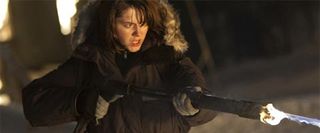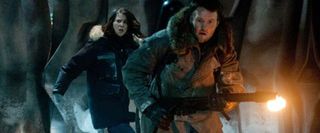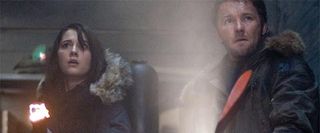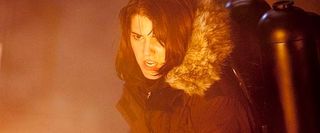Mary Elizabeth Winstead Didn't Fear Flamethrowers In The Thing

Holding a fake gun on a set isn’t scary. Sure, there are things that could potentially go wrong (Research: Brandon Lee), but for the most part it’s pretty safe. A flamethrower, on the other hand, is a completely different story. You’re walking around with a pilot flame and a backpack filled with gas, and if those things get too close together it’s curtains for you. But don’t tell that to Mary Elizabeth Winstead; she’ll just laugh it off.
I recently had the chance to sit down with the actress and not only talk about her flamethrower experience, but also everything else related to her new film, The Thing. Check out the interview below in which she talks about her favorite horror movies, dealing with the extreme Toronto summer in Antarctica gear, and acting scared.
You have a bit of experience in the horror genre thus far in your career. What keeps bringing you back to the genre?
I think a lot of my earlier work was more coincidence than anything, because I was just trying to work as an actor, and I kind of thought after doing a few horror films I thought “Oh I won't do those anymore, I've done that thing.” But I just love horror films. I'm a big horror fan. And when I read a good horror script, I get really, really excited. So even though I might have someone saying, “Oh, don't do horror films, stray away”, I just can't help but want to do it, because a good portion of my favorite films of all time are horror films. I just keep trying to reach that level of greatness.
What are your favorites?
Rosemary's Baby, The Shining, Alien, and The Thing, the Carpenter version. Those are probably my staples.
What was your first reaction when you got this script?
CINEMABLEND NEWSLETTER
Your Daily Blend of Entertainment News
When I first heard I was gonna get it I kind of rolled my eyes, I was like, “Seriously?” Y'know? [laughs] But then when I read it I thought it was really smart and kind of in spite of myself I really liked it. I was like, “Oh man, I really want to do this, now I have to deal with all those people thinking it's not gonna be good.” And, um, I was still hesitant because it was all still contingent on who's making it, you know? And I met with the producers and they were so smart and so respectful, so passionate about the Carpenter version. They were like real fanboys. It wasn't like, well, a lot of time you meet producers and they're like “We're gonna make it modern, we're gonna make it sexy!” And use those kinds of words and you're like, “Oh no...” And they were so the opposite, they were like, “Practical effects, we want it to feel like the world of the Carpenter film, we want to make a movie for fans of that film.” And also make a movie that can stand alone for a new generation that hasn't heard of the Carpenter version. So it was really exciting to hear their point of view and to feel like it was in good hands and to meet Matthjis and get a sense of who he was as well. It all just seemed really mature and respectful and exciting, and not just a bunch of cheesy and shlocky producers trying to make a buck.
Being a veteran of the horror genre now, I also want to ask about acting in them, as fear is a very strong emotion. It’s not exactly easy to pick up without stimuli. And when you're doing a film you're asked to do it take after take, so how do you do that?
Yeah, I mean it is kind of tricky, you definitely have to figure out what would terrify you in a deep way, a more emotional way that you can connect with it. Then on top of that I would always have to be doing jumping jacks or pushups or something just because the adrenaline you would feel in that situation is so hard to just create from nowhere. So Joel and I would always be doing pushups with the flame thrower packed on our backs. [laughs] And like, dude, I was always jumping up and down. But the tough thing about doing those scenes is that by the end of a day, after doing it all, you do start to feel light headed. And you're like “Ok, I made it, I'm going to go sit down,” I can barely pull my head up I've been breathing so hard.

And what's the experience using the flamethrower? I’ve talked to actors that have used them before and they were absolutely terrified.
Really?
Yeah, they're dealing with this huge gas pack and fire...
God... I don't know what's wrong with me. [laughs] People have really made me start to feel weird that I'm not... I just thought it was so fun. I guess I'm really used to working with stunt people, so I'm used to just diving in and trusting them and I never, like, worry about what's going to happen... it's probably a bad thing I guess? [laughs] I mean, there's always like “They know what they're doing, right?”
I think it's a valid thing.
Yeah
I mean these productions are heavily insured…
Right, yeah! And they know what they're doing. And so there were certainly moments that were a little bit scary, but, for the most part, I felt really comfortable using it and I felt like everyone was really aware of the safety precautions and so I just had fun with it, I really, really enjoyed it.
I know in addition to filming in Toronto you also did some filming in northern Canada.
Yeah.
How was that experience?
It was great! It was basically the border of Alaska in this little town called Steward, I believe. It was so gorgeous, I mean, we took a helicopter up to this glacier that just looked like miles of completely untouched snow and it felt like going... somewhere where no one else had ever been, which was really nice. We did it before we started shooting the rest of the movie. It was a nice way to kick it off, to sort of feel that kind of awestruck feeling that you would really feel going to a place like Antarctica. So for the beginning of the movie it was really good to have had that experience, to go into it knowing how exciting it would be for the character.

I heard from Eric Christian Olsen that they even brought up extra food because there was, like, a risk that he could get snowed in.
Mary: I think he's just trying to tell a good story. [laughs] I don't remember that.
Yeah?
Yeah, he's funny because he keeps talking about how that experience was kind of scary, like it's isolating in all this vast snow, but I was just like a little kid, I was so happy the whole time we were there that I don't know what he's talking about.
It seems like you don't fear a lot. [Laughs]
Noooo-
You're fearless, that's pretty awesome.
No, I'm kind of scared of heights... I'm becoming scared of heights. It's like a new thing. I'm realizing that I really don't like it.
They just started to creep you out one day?
Yeah, like my friends were talking about going sky-diving and stuff. I literally get anxiety just thinking about sky-diving or bungee jumping or anything like that. I don't know, it's weird... that's my one, like, weird fear. Yeah.
Ok, well, another question, bridging from the on location thing: One location vs. set, practical effects vs. CGI- I assume that has to play a role in your performance.
Yeah, definitely. When you're just working with a tennis ball, you can just get so lost and forget where you are and what you're supposed to be looking at. You become so unfocused, even if you're trying really hard to imagine what it would be like. So having something really there to react to, something that's generally grotesque, y'know, and to feel like that's really there and in front of you, really alive. It almost makes you feel like a kid, in that you get an imaginary world that you can really fully believe in and give yourself over to . So yeah, it's hugely helpful to the actors.

I was actually on set last summer, I got to see the big effects workshop- did you get to spend any time in there?
Yeah, a little bit, um I got to check everything out just a little bit before we started shooting. And I was so impressed, it was like crazy... the things they're able to do and how disgusting they're able to- but it's like grotesquely beautiful in a way because you so admire the skill of it that there's definitely a beauty about it. But yeah... it's gross.
I was amazed by the amount of detail those guys put on, just looking at the eyes-
When they recreate a cast member's face and distort it in that way, it's unbelievable.
It's like reaching the worst depths of the uncanny valley.
Um hmm.
I guess just to talk about the original- Oh, I guess I shouldn't say original-
I know, it's so confusing! Like not the original original, but-
Yeah. Again, the Carpenter version...
Yes.
There are no female characters, with the exception of the voice on MacReady's computer, and that gets smashed in three seconds. So I'm curious, was that harder to use it as a reference point because there are no female characters? Or was it just, like, an emotional kind of bridge?
Um, I think all of us coming into it, being big fans of the Carpenter version, we all just took that as “This is the world that we all exist in”, y'know? And this is the movie that we all love and we're going to try to respect and we're going to try to keep all the elements of character development and paranoia, fear, and isolation that really made that movie so great, and that's what made it stick with people so much. But there are all different characters. We have so many different dynamics with bringing in all the Norwegians and having this language barrier and having a female lead, and all of those things for me are what made me happy and excited to do it because I knew that it was gonna make it a really different film. If we had an all-male cast, there was automatically gonna be comparisons as to who's playing who in this version, and when we blow that out of the water by just making them totally different, you don't have to deal with that. So I think it was really smart of them to pick a female lead. And yeah, when I first signed on to it I was like, “Oh my god am I going to have to be MacReady? Am I gonna have to, like, try and act like him?” But I literally thought about it for like 5 minutes and I was like, “No! Noooo. No.”

Did it help that there was a second actress on set?
Yes, yes. Um, yeah, Kim Bubbs played Juliet and it was definitely nice to have some feminine energy coming every now and then. But we also had a crew that had lots of great women, so even though we had a cast full of men, I didn't feel like I was alone.
In a boys club.
Yeah, yeah, exactly.
When it comes to horror films I'm always curious about environments on set because you're making a movie which, I have to imagine, must be an absolute blast, but you're making a horror film- there's got to be tension just from making the film itself.
Right.
Does the tone of the movie leak on to the set in between takes?
It was a lot of fun. I mean, from what I remember it was just like, we are all a bunch of big kids, everybody in the cast was just like a big kid who loved to goof around and just play and stuff, which made it a really fun experience. For me it was hard work, like it was exhausting, so there's a lot of working... and going home and sleeping and working... and going home and sleeping. So you start to feel kind of weird when you live like that for a long enough time. But I'm so lucky to be surrounded by people who have such great energy about them that I never got, like, tired on set. Everybody was making me laugh constantly, just having a great time. So it was great.
I also had the chance to talk with Joel Edgerton and he was talking about how he hates the cold so that working in Toronto in the summer actually kind of helped. Do you feel the same way?
You know, I don't want to live in it, but I don't mind visiting cold climates. I don't want to drive in it or shovel it, but I don't mind just spending some time. Actually when it got to be hot, I was like, “Come on man!” One guy passed out, the rest of us were on the verge of passing out, there were definitely some heat exhaustion moments happening for sure. So I would have preferred- I mean, it's hard to say, because we did have a month of night shoots in the beginning when it was freezing, and that was awful too. [laughs] So it was just, kind of pick from the worst. On any movie there's going to be something like that that you have to contend with, but it's such a great experience that you're like, “Whatever.”

And how much input did you have in constructing Kate as a character?
Quite a bit really, it was a pretty collaborative process. I mean, certainly the character that was on the page is close to the character that's in the movie, I didn't come in and change everything or anything like that. But there were sort of things in the script that I thought could be taken as flirtatious moments and things like that, not necessarily written that way but bonding moments with Joel's character and things like that and I was just like, here they bond right now, like she sees something in him that she trusts and that's an important element of their relationship, but they're not gonna have a moment where they sit down and shoot the shit about life or something because they're just trying to survive and I felt like because of the characters and having a female lead and coming from a film that was all male, I didn't want anything to be misconstrued as there's a relationship forming there that's romantic, because I thought that would really take it to a place that was silly. I thought that without that it stayed more mature and adult, and really realistic. So things like that. I guess just with Matthjis [van Heijningen Jr.] coming up with her sort of, character and how focused and serious she is, when I first signed on to it I was like, “Should we make her more funny? What are we going for here?” And from a few conversations with him it was really clear that no, this is a girl who is really serious about what she does, she's really focused, really intelligent... just because there was a character in the original that said funny things doesn't mean she has to be like that too.
It sounds like when you get a character you really sink your teeth into it. I mean, is that always the case?
Yeah, it is, I mean I certainly don't sit down and say, “Oh I'm going to become this character right now!” It's just sort of something that slowly happens with wardrobe and makeup and creating the character, coming up with where they come from, what their background is, and how that informs the way that they speak and how they carry themselves, things like that I guess. And to me, that's what every actor does. I don't know if there's something about me that is more easily changed by the superficial aspect of hair and makeup and clothes, now that people seem to not recognize me from role to role.
I think it's completely legitimate, especially considering that this happens to be a period piece.
Right.
That obviously played a role.
Yeah, absolutely. I know, yeah, sometimes we'd be improvising stuff and you'd want to interject something like, “Like”, or saying things like that a lot, and “like” is a really modern thing to say. Y'know, “I was, like, gonna do that!” [laughs] I don't know if that's really right.
Knowing your affinity for the Carpenter version, I mean this film's a prequel but it does have connections to the Carpenter version, for example the bloody ax sticking the door, the ice block…what is it like knowing that you're a part of that experience and a part of that universe?
It's really cool, and it's really scary, because if you do a good job then it's really cool and if you don't do it well then it's just like, “Ohhh, the Carpenter fans are gonna hate us.” But I feel like this film was done with so much love for that film that there's no way that, at least for us, there's no way that we could feel anything but really great about it.

Eric Eisenberg is the Assistant Managing Editor at CinemaBlend. After graduating Boston University and earning a bachelor’s degree in journalism, he took a part-time job as a staff writer for CinemaBlend, and after six months was offered the opportunity to move to Los Angeles and take on a newly created West Coast Editor position. Over a decade later, he's continuing to advance his interests and expertise. In addition to conducting filmmaker interviews and contributing to the news and feature content of the site, Eric also oversees the Movie Reviews section, writes the the weekend box office report (published Sundays), and is the site's resident Stephen King expert. He has two King-related columns.
Most Popular






